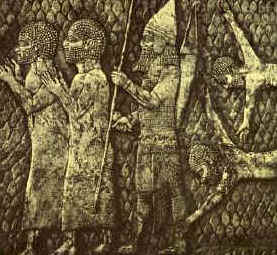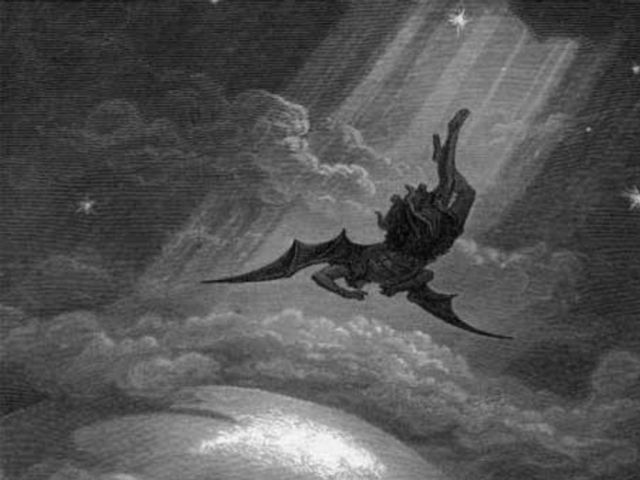- Michael....His name means - "Who is like unto God?"
- Gabriel.....His name means - "God Conquers"
- Raphael....His name means - "God Heals"
- Uriel.........His name means - "God is my Light"
- Raguel......His name means - "Friend of God"
- Ramiel......His name means - "Thunder of God"
- Sariel........His name means - "Command of God"
While the Book of Enoch is considered non-canonical in most Christian Churches, it was explicitly quoted in the New Testament (Jude 1:14-15) and by many of the early Church Fathers. The Ethiopian Orthodox Church to this day regards it to be canonical.
 Michael and Gabriel are recognized as the most high-ranking of angels in Judaism, Islam and mainstream Christianity, as they are the only angels specifically named in the Holy Bibles of these religions, with Michael being the only one to be referred to as an "archangel". The Book of Tobit, which is identified in the Catholic and Orthodox Bibles, but considered apocryphal by Protestants, mentions Raphael as an archangel.
Michael and Gabriel are recognized as the most high-ranking of angels in Judaism, Islam and mainstream Christianity, as they are the only angels specifically named in the Holy Bibles of these religions, with Michael being the only one to be referred to as an "archangel". The Book of Tobit, which is identified in the Catholic and Orthodox Bibles, but considered apocryphal by Protestants, mentions Raphael as an archangel.
Various Abrahamic faiths have identified a group of seven Archangels, but the actual angels vary, depending on the source. Gabriel, Michael, and Raphael are always mentioned; the angel Uriel, who is mentioned in the Book of Enoch (2 Esdras), is commonly included in most religious accounts of the archangels.
The earliest Christian mention of the archangels is by Pope Gregory I who lists them as Gabriel, Michael, Raphael, Uriel, Simiel/Samael ("Poison of God"), Oriphiel/Phanuel ("The Face of God") and Raguel.
The archangels named in Islam are:
- Cebrail/Jibril (Gabriel) ..... He is said to be the angel that revealed the Quran to Muhammad; known as the angel who communicates with the prophets. Various hadiths (traditions) acknowledge his role in delivering divine messages from the Almighty (God) to the prophets.
- Mikhail (Michael) .... He is often depicted as the archangel of mercy and responsible for bringing rain and thunder to the Earth.
- Israfil (Raphael) ..... He is the angel responsible for signaling the coming of Judgment Day by sounding a trumpet.
- Azrael (Uriel) His name means"One Whom God Helps"..... He is portrayed as the "Archangel of Death" in Muslim tradition.
Note: The name, Azrael, is mentioned in a few Muslim books, although some Islamic scholars argue that it has no basis of reference.
In Chapter 21 of the Book of Enoch it also mentions Jerahmeel ("God pities" or "May God have compassion"), while other apocryphal sources list the names such as Izidkiel ("righteousness of God"), Haniel/Hanael ("Glory of God"), and Kepharel ("Beauty of God").
 Metatron is also considered an archangel in some branches of Judaism. His name means, "Recording Angel" or "Chancellor of Heaven". The name Metatron is not mentioned in the Hebrew Bible, nor is it mentioned in the early Enoch texts. The origin of this archangel is debated, although he is mentioned in a few passages in the Talmud. Metatron is primarily mentioned in the mystical Kabbalistic texts within the Rabbinic literature. He is called the "highest of the angels", though the acceptance of this angel is not canonical in all branches of the Judaic faith.
Metatron is also considered an archangel in some branches of Judaism. His name means, "Recording Angel" or "Chancellor of Heaven". The name Metatron is not mentioned in the Hebrew Bible, nor is it mentioned in the early Enoch texts. The origin of this archangel is debated, although he is mentioned in a few passages in the Talmud. Metatron is primarily mentioned in the mystical Kabbalistic texts within the Rabbinic literature. He is called the "highest of the angels", though the acceptance of this angel is not canonical in all branches of the Judaic faith.
According to the sacred texts of Zoroastrianism, it alludes to the six great Amesha Spenta (literally "Bounteous/Holy Immortals") of Ahura Mazda. The six divine beings were created by Ahura Mazdā, the Wise Lord, to help govern creation. Three are commonly believed to be male and three are female. They are considered the ministers of his power against the evil spirit, Ahriman, and are depicted clustered about Ahura Mazdā on golden thrones attended by angels. They are the everlasting bestowers of good. They are worshipped separately and are said to descend to service on paths of light. In later Zoroastrianism each is opposed by a specific archfiend.
Chapter 20 of the Book of Enoch mentions seven holy angels who watch, that often are considered the seven archangels. The Life of Adam and Eve lists the archangels as well: Michael, Gabriel, Uriel, Raphael and Joel. Even the medieval Jewish philosopher, Maimonides, made a Jewish angelic hierarchy.
Eastern Orthodox tradition mentions "thousands of archangels; however, only seven archangels are venerated by name. Besides Michael, Gabriel and Raphael, Uriel is included in this list, and the other three are most often named Selaphiel ("Intercessor of God" or "Prayer of God"), Jegudiel ("Glorifier of God"), and Barachiel ("Blessed by God").
 According to Rabbi Simeon ben Lakish of Tiberias (230–270 A.D.), specific names for the angels were brought back by the Jews from Babylon. While angels were referred to in the stories of Abraham (an angel intervened to save Isaac), Lot (angels warned of the impending destruction of Sodom and Gomorrah) and Jacob (who wrestled with an angel), the Prophet Daniel was the first biblical figure to refer to individual angels by name (such as Gabriel and Michael). It is therefore widely accepted that Jewish interest in angels developed during the years of Babylonian captivity.
According to Rabbi Simeon ben Lakish of Tiberias (230–270 A.D.), specific names for the angels were brought back by the Jews from Babylon. While angels were referred to in the stories of Abraham (an angel intervened to save Isaac), Lot (angels warned of the impending destruction of Sodom and Gomorrah) and Jacob (who wrestled with an angel), the Prophet Daniel was the first biblical figure to refer to individual angels by name (such as Gabriel and Michael). It is therefore widely accepted that Jewish interest in angels developed during the years of Babylonian captivity.
According to Rudolf Steiner, four (4) important archangels also display periodic spiritual activity over the seasons: Spring is Raphael, Summer is Uriel, Autumn is Michael, and Winter is Gabriel. Likewise, seven archangels are related to the seven days of the week: Michael (Sunday), Gabriel (Monday), Raphael (Tuesday), Uriel (Wednesday), Selaphiel (Thursday), Raguel (Friday), and Barachiel (Saturday).
While there are various archangels named by various religious sects, there are only two commanding angels that are widely accepted by all religions:
- Michael has been depicted from earliest Christian times as a commander and leader, who holds in his right hand a spear with which he attacks Lucifer/Satan, and in his left hand a green palm branch. At the top of the spear there is a linen ribbon with a red cross. The Archangel Michael is especially considered to be the Guardian of the Orthodox Faith and a fighter against heresies.
- Gabriel is the herald of the mysteries of God, especially the Incarnation of God and all other mysteries related to it. He is depicted as follows: In his right hand, he holds a lantern with a lighted taper inside, and in his left hand, a mirror of green jasper. The mirror signifies the wisdom of God as a hidden mystery.
In closing, it is interesting to note that Lucifer (Satan) was once an archangel as well. His name means "The Morning Star" or the "Bringing of Dawn". In ancient Canaanite mythology, the morning star is pictured as a god (Attar) who attempted to occupy the throne of Ba'al and, finding he was unable to do so, descended and ruled the underworld. The original myth may have been about a lesser god Helel trying to dethrone the Canaanite high god El who lived on a mountain to the north.
 In Islam, Satan is known as Iblīs and sometimes referred to as Shaytān. He is associated with the "morning star" which is known as Dajaal, but the accounts of him resemble the earlier fallen-angel accounts in the Books of Enoch and the Christian canon of Revelation (12:7-9). Iblis was banished from Heaven for refusing to abject himself before Adam, which is similar to the earlier 3 Enoch (chapter 4) in which all of the angels prostrate themselves before Enoch, an early descendant of Adam. Thus, he sins after the creation of man. He asks God for a respite until judgment day rather than being consigned to the fire of Hell immediately. God grants this request, and Iblis then swears revenge by tempting human beings and turning them away from God. The Creator tells him that any humans who follow him will join him in the fire of Hell at judgment day. But Iblis will not have power over all mankind, but only those who choose to follow him. This story is cited multiple times in the Qur'an for different reasons.
In Islam, Satan is known as Iblīs and sometimes referred to as Shaytān. He is associated with the "morning star" which is known as Dajaal, but the accounts of him resemble the earlier fallen-angel accounts in the Books of Enoch and the Christian canon of Revelation (12:7-9). Iblis was banished from Heaven for refusing to abject himself before Adam, which is similar to the earlier 3 Enoch (chapter 4) in which all of the angels prostrate themselves before Enoch, an early descendant of Adam. Thus, he sins after the creation of man. He asks God for a respite until judgment day rather than being consigned to the fire of Hell immediately. God grants this request, and Iblis then swears revenge by tempting human beings and turning them away from God. The Creator tells him that any humans who follow him will join him in the fire of Hell at judgment day. But Iblis will not have power over all mankind, but only those who choose to follow him. This story is cited multiple times in the Qur'an for different reasons.
In Abrahamic tradition, Lucifer is generally referred to as the leader of the "fallen angels" who tried to overthrow God's heavenly kingdom.
"How you have fallen from heaven, morning star, son of the dawn! You have been cast down to the earth, you who once laid low the nations! You said in your heart, 'I will ascend to the heavens; I will raise my throne above the stars of God; I will sit enthroned on the mount of assembly, on the utmost heights of Mount Zaphon. I will ascend above the tops of the clouds; I will make myself like the Most High.' But you are brought down to the realm of the dead, to the depths of the pit. Those who see you stare at you, they ponder your fate: 'Is this the man who shook the earth and made kingdoms tremble, the man who made the world a wilderness, who overthrew its cities and would not let his captives go home?'" ~ Isaiah 14:12
For further information, please visit:
http://supernatural.wikia.com/wiki/Archangels
No comments:
Post a Comment